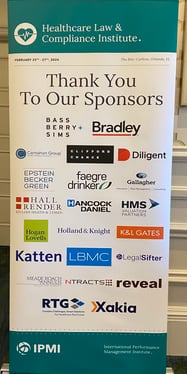I can’t stop thinking about our recent experience at the IPMI Healthcare Law and Compliance Institute. In late February, Nolan O’Connor and I headed to the beautiful Ritz Carlton Resort in Orlando to engage with a powerhouse group of hospital and healthcare lawyers and, we thought, educate them on the benefits of modern legal matter management.



The result? We, too, got educated. The event was a well-organized buffet of informative sessions covering a broad range of topics, and we soaked up every opportunity to immerse ourselves in the critical issues and pain points experienced by hospital and healthcare legal and compliance teams.
What did we learn? First and foremost, the post-pandemic hangover is real:
- Financial challenges are dire.
- Workforce challenges are dire.
These challenges do not discriminate by size but create the perfect storm for small community healthcare systems. Across the board, it’s a battle for survival in an industry sweating through merger and acquisition fever. Add a dose of election-year uncertainty, and you can cut the stress level with a knife.
How does this impact legal leadership? There is intense pressure to be a facilitator, not a blocker, and the need to be a strategic partner is more important than ever.
Some themes emerged from the opening remarks that carried through the three-day event:
- Be at the executive table.
- Be proactive and get brought in early.
- Think creatively.
So, how do hospital and healthcare GCs and CLOs assume a more strategic role?
The closing session tackled this topic head-on. Moderated by Greg Matis, SVP, Chief Legal Officer at Intermountain Health, the panel on “Maximizing the Role of Healthcare GCs and CLOs in an Evolving Environment” offered a wealth of experience and consensus around key insights, including:
Amy Bulpitt, SVP, Chief Legal Officer of Hospital Sisters Health System, kicked off by emphasizing the importance of “building trust with the C-suite and Board.” In an industry known for its high pressure and rapid decision-making, Amy added, “Be calm. Composure is key.”
"Understand the business," offered Imad Abdullah, SVP, Chief Legal Officer, and General Counsel of Regional One Health. "Know your metrics—they add a credibility element to the advice you provide, and complete tasks accurately and on time.”
Terri Meldrum, SVP, General Counsel of OhioHealth, summed it up nicely: “Be approachable.” She added that the “CEO should see you as their protector.” Terri recalled a specific comment from her CEO: “If I was ever in a dark alley, this is who I want next to me.”
A GC or CLO "needs to be okay not needing the spotlight," noted Greg Matis. Strategic legal leadership “is most effective if there’s a willingness to be comfortable in the background.”
The panel and audience agreed that to be an effective and strategic facilitator, don’t just say “no.” Provide an alternative. Understanding what the CEO is ultimately trying to achieve and finding a pathway forward is critical. Offer “No, but… or Yes, and….” It’s the second piece of advice that’s most important. If you are disciplined with this approach and can’t offer the second piece of advice, your CEO will understand that no means no and why.
Overall, the Institute was a generous sharing of tips, resources, ideas, and a deep support network among hospital and healthcare legal leaders trying to achieve the same goal: “People helping people help people.”
Healthcare teams: Get started with Xakia's legal matter management solution
Matter management systems are designed to streamline and centralize all matter-related information, making it easily accessible and manageable for corporate legal teams. Matter management software solutions allow Legal Departments to track deadlines, automate workflows, collaborate with team members, and generate reports. To learn more about Xakia's leading matter management software, get in touch with the team today for a demo, or sign up for a free 14 day free trial.
